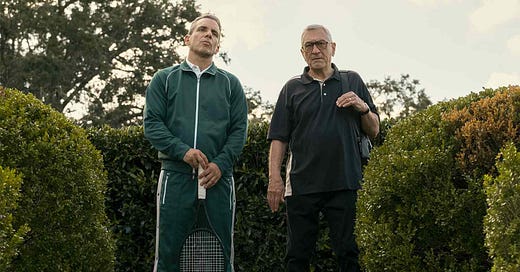About My Father
Robert De Niro polishes his grumpy comedy credentials as an annoying Italian stereotype in this slightly autobiographical comedy from star and co-writer Sebastian Maniscalco.
Robert De Niro spent decades as an icon of cinematic dramas, and then for the last 20 years has mostly been goofing on his image as an irascible tough guy. From the Fockers movies to “The War with Grandpa” and the “Analyze This/That” flicks, the actor has seemed content to coast through amiable comedies ranging from the decent to the lame.
I’m still trying to get the image of De Niro getting busy with Aubrey Plaza in “Dirty Grandpa” erased from my brain cells.
“About My Father” is much of the same, with De Niro playing an Italian-American oldster who’s a living embodiment of every goombah stereotype you’ve ever seen in the movies. It’s a classic fish-out-of-water tale as his character, a blue-collar hair stylist from Chicago, spends the holiday weekend with the blueblood family of his son’s girlfriend — think ‘Uncle Vito at the country club,’ and you’ve got a pretty good picture.
The story is the (slightly) autobiographical dreamchild of star/co-writer Sebastian Maniscalco, a standup comedian who’s broken out in the last few years. I like his stuff — imagine a tough Italian-American version of Jerry Seinfeld. Much of his comedy is based on being raised as an old-school manly type in a touchy-feely modern world.
The movie explores his relationship with his father, who parented him to be the way he is. Salvo (De Niro) never hugged him as a child, forbade ordering appetizers or desserts when eating out, and insisted he never take a handout or allow anyone to look down on him.
Using his real name in the movie, Sebastian is on the verge of popping the question to his longtime girlfriend, Ellie (Leslie Bibb), a painter from a rich family. Her parents, Bill (David Rasche) and Tigger (Kim Cattrall) — yes, that’s really her name — invite them out to their summer home in Virginia for the Fourth of July weekend. He takes it as a sign they are ready to accept him into the family, so he plans to ask her to marry while there.
Problem is, his dad is recently a widower and doesn’t want to be left alone for the weekend. He also harbors suspicions Ellie’s parents look down on workaday folks like them. Ellie comes up with the idea of bringing Salvo along to ease his doubts, and we’re off to the races.
Maniscalco’s a good-looking guy and has a natural ease on the screen. He’s also about my age and therefore a bit long in the tooth to be playing a young guy just falling in love. At least they cast Bibb, his contemporary, as the love interest so there isn’t a glaring contrast between them. The actual relationship between Sebastian and Ellie gets pushed to the background in favor of that with Salvo.
The first half of of the movie is pretty tedious, with a lot of predictable jokes and set-ups. Salva putters around in sunglasses and tracksuits like a downmarket Tony Soprano, muttering about the richies and smoking a stogie.
Ellie’s two brothers are Lucky (Anders Holm), a casually braggadocios tool, and Doug (Brett Dier), a loopy New Age type who plays bowls as instruments and is studying to be a healing coach, one of those careers reserved for people who either were born very wealthy or want to take advantage of those who were.
Tigger and Bill wear their privilege lightly. Bill, a hotel magnate, says without irony that his dad showed him tough love by only giving him only hotel to manage as a youngster. She is a conservative U.S. senator who likes to go on MSNBC and tussle with the libs.
They’re genuinely welcoming to Sebastian and his father, and seem to truly love their children — perhaps unconsciously spoiling them and failing to push them to try a little harder. If you think there’s going to be a big twist where they’re revealed to secretly be nasty or racists or something, I’m here to tell you it’s not going to happen.
The humor is decent but obvious — Sebastian loses his swim trunks while doing water sports, Salvo whips up a traditional Italian dinner using some unfortunate ingredients, father and son squabble continuously about how embarrassing the elder is to the younger.
Just when I was growing tired of the movie, it perked up in the last act. (Austen Earl co-wrote the script and Laura Terruso directs.) The jokes start to gain a little zip and there’s even a genuinely tender moment or two.
I always say it’s better for a film to start out wobbly and gain steam as it goes along rather than the other way around. “About My Father” may just be a rote comedy vehicle for Maniscalco and De Niro, but it finds its groove — eventually.





